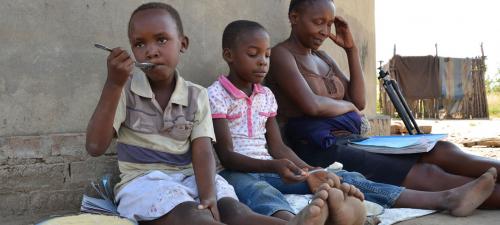Over 10,000 confirmed COVID-19 cases in Africa; Zimbabwe and South Sudan among most vulnerable
The World Health Organization (WHO) warned on Wednesday that the number of COVID-19 cases in Africa has now risen to more than 10,000, claiming more than 500 lives.

A mother homeschools her children in Shamva district, Zimbabwe, during the COVID-19 pandemic.
The virus was slow to reach the continent compared to other parts of the world, but infection has grown exponentially in recent weeks and continues to spread, the UN health agency said.
Africa’s first case of new coronavirus was recorded in Egypt on 14 February. Since then a total of 52 African countries have reported cases and “a significant number” have reported cases in multiple provinces.
“COVID-19 has the potential not only to cause thousands of deaths, but to also unleash economic and social devastation”, warned Matshidiso Moeti, WHO Regional Director for Africa.
She called for communities to be empowered by local authorities, and for provincial and district levels of government to ensure that they have the resources and expertise to respond to outbreaks.
To help combat the virus, WHO is working with governments across Africa to boost surveillance, testing, isolation, contact tracing, infection prevention and control, together with risk communication and community engagement.
The UN health agency reported that so far that Ghana, Kenya, Ethiopia, Egypt, Morocco, Tunisia and Nigeria have expanded national testing to multiple labs, allowing for a decentralized and more efficient system.
Supporting Zimbabwe
At the same time, urgent international support is needed to prevent millions of desperate Zimbabweans from plunging deeper into hunger.
According to the World Food Programme (WFP), as COVID-19 takes hold, the country’s already severe climate- and recession-induced hunger crisis is becoming even more profound.
“With most Zimbabweans already struggling to put food on the table, the COVID pandemic risks even wider and deeper desperation”, said Eddie Rowe, WFP’s Country Director.
Cereal production in 2019 was half that of 2018, and less than half the national requirement. Experts predict that the upcoming 2020 harvest will be even poorer.
With unprecedented hyperinflation having pushed the prices of staples out of reach for most Zimbabweans, increasingly desperate families are eating less, selling off precious belongings and going into debt.
Moreover, COVID-19 threatens to exacerbate Zimbabwe’s dire economic and hunger crises, drastically affecting the lives of people in both urban and rural areas.
And while the UN agency supports communities afflicted by “crisis” and “emergency” food insecurity, more funding is needed.
“We must all do our utmost to prevent this tragedy turning into a catastrophe”, he warned.
WFP is appealing for $130 million to sustain an emergency operation through August to prevent millions of the most vulnerable from plummeting even further
COVID-19 spread threatens South Sudan
Confirmation earlier this week that the new coronavirus pandemic has reached South Sudan has prompted UN-appointed human rights experts to renew their call for an end to fighting there.
In an appeal to the authorities to step up efforts to contain the spread of the virus, the Commission on Human Rights in the world’s youngest country warned that 1.5 million people who’ve fled years of violence are at greater risk than ever.
Commission chair Yasmin Sooka said that it was unrealistic to even “talk about strict social distancing” at the moment.
So many displaced persons still live in tents, she said, “often inches apart from one other, and subsisting on rapidly diminishing humanitarian aid”.
They have only limited access to healthcare, water, hygiene and sanitation, food, and adequate housing, with women and children among the worst affected by these shortages, Ms. Sooka explained.
To halt the spread of the virus, the independent experts, which report to the Human Rights Council, urged the new Transitional Government of National Unity to quell intercommunal violence.
They should demonstrate “resolute leadership” by involving local communities in the public health response and encourage a shared national identity, the UN panel underscored.
Source:UN
- 258 reads
Human Rights
Ringing FOWPAL’s Peace Bell for the World:Nobel Peace Prize Laureates’ Visions and Actions

Protecting the World’s Cultural Diversity for a Sustainable Future

The Peace Bell Resonates at the 27th Eurasian Economic Summit

Declaration of World Day of the Power of Hope Endorsed by People in 158 Nations

Puppet Show I International Friendship Day 2020

